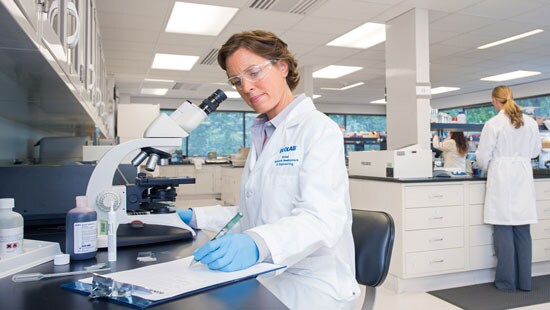Are all hand disinfectants the same?
How to choose the right product for different needs that is both effective and skin friendly?

The COVID-19 pandemic has registered an exponential demand for hand disinfectants, hands being one of the main means of transmission of viruses and other diseases. Various products have popped up on the market to respond to the ongoing emergency, sometimes mistakenly perceived by consumers as disinfectants or having virucidal efficacy while they only have cosmetic-grade effectiveness. This article is intended for Ecolab customers in the commercial and industrial sectors as a guide to select high-quality, effective and skin-friendly hand disinfectant products for their customers and employees.
OVERVIEW OF DISINFECTION AND DISINFECTANT PRODUCTS
Products with bactericidal, fungicidal, virucidal or any other efficacy against microorganisms, are identified at European level as biocides; in Italy they are called Medical-Surgical Devices (PMC). These products are regulated by special regulatory processes, meaning that they must receive a national authorization from the Ministry of Health, after evaluation by the Higher Institute of Health, which verifies the effectiveness, safety and compliance of the statements reported on the label, before they are put on the market.
PMCs are a different type of product from the category of detergents, and cosmetic products, with which they should not be confused. Cleaners and sanitizers are not subject to specific authorizations; their production must simply comply with the directives for detergents or cosmetic products (skin sanitizers) or other special legislation.
The reference legislation for the production of biocides in Europe is the European Regulation (EU) 528/2012 (known as BPR, Biocidal Products Regulation) while PMCs are regulated in Italy by DPR 392/1998, together with the Provision of 5 February 1999.
The authorization for the market access of PMCs for the disinfection of human skin is issued in Italy by the Ministry of Health, after technical and scientific evaluation of the documentation by the Higher Institute of Health (ISS).
There are also PMCs for exclusive professional use which requires specific training and the obligation to wear Individual Protection Devices (DPI). The word "Professional use only" is be displayed on these products. In the absence of such wording, the product is intended for public use.
BIOCIDE PRODUCT LABELS
Labels on commercial products must contain the necessary information to warn users of the possible danger and the consequent need to manage the associated risks under the provisions of The European Regulation (EC) 1272/2008, known as CLP: Classification, Labelling and Packaging. If the product is classified as dangerous or consists of one or more substances deemed dangerous, it is mandatory to label it.
The general labelling requirements prepared by the CLP apply to both authorized disinfectants and detergents or sanitizers (free sales products). For free-sale products, classification and labelling are prepared directly by the supplier, while for PMCs, and in general for disinfectants, the label proposed by companies that put products on the market must be authorized by the Ministry of Health.
The effectiveness of commercial disinfectants against pathogens such as viruses, for example, is labelled on the basis of the scientific evidence presented by the company that puts them on the market and authorized by the Ministry of Health. For example, if a product reports a claim for activity against enveloped viruses on the label, this means that its effectiveness has been tested using specific tests conducted according to the appropriate testing standards for the intended use of the product, which is reported in the product authorization request file. In the case of sanitary products, detergents or cosmetics, if attributed, it means that this effectiveness has not been tested and it is not certain that it has been conducted in accordance with the indications of the specific European "EN" rules. The presence of the registration number on the packaging of a PMC confirms that the product has been approved by the Ministry of Health, after positive evaluation by the Higher Institute of Health of tests and documentation including composition, stability, effectiveness, and classification of danger.
PMC products or biocides placed on the market in Italy must have labels in Italian and detail the production plant where the product has been manufactured.
EFFECTIVENESS OF BIOCIDE PRODUCTS
PMCs and biocide products have an action against viruses, in addition to bacterial and/or fungicide action. The active ingredients generally present in effective products against viruses are ethanol (ethyl alcohol) and chlorhexidine, each of which acts according to a precise mechanism of action against viruses. Most of the products on the market are based on ethyl alcohol, the percentage of which is expressed on the label. There is a range of alcohol concentration considered optimal for the product to be effective and this percentage is at least 70 percent w/w or higher. The concentration of ethanol in a product can be expressed in volume or weight. If the percentage is expressed in volume of alcohol per formulation volume (v/v), this will be less than the corresponding percentage expressed in weight/weight (w/w), because the density of ethyl alcohol is less than 1 g /cm3. For this reason, it is recommended to express concentration in a w/w formula because the weight factor, unlike volume, cannot be affected by temperature, specific weight, and concentration of reaction. It is important to verify that in the composition of the product, the indication of the presence of ethyl alcohol is expressed in weight (grams) and not in volume to ensure the correct concentration in the product.
CORONAVIRUS EMERGENCY AND WHO HAND FORMULATION APPROVALS
During the COVID-19 pandemic, the market experienced a very strong surge in the demand for hand disinfectants, which manufacturers have not always been able to satisfy. To facilitate manufacturers and meet the increased market demand in Europe, the European Chemical Agency has introduced exemptions to Article 55 of the Biocide Product Regulation, which have allowed a provisional formulation to be produced according to WHO standards. These extraordinary measures have been launched to shorten the long timeframe for national authorizations of biocide products and to reduce the public risk posed by the pandemic, especially for health professionals. These exemptions, introduced with the aim of protecting public health, have sometimes allowed production to be enlarged with uncontrolled and unapproved formulations and it may be difficult to navigate the variety of products currently on the market.
ECOLAB POSITIONING
Ecolab has always been committed to ensuring public health through hygiene and disinfection of environments, operating in a wide range of institutional and industrial sectors, from healthcare, hospitality and catering, to industrial manufacturing processes in the food, cosmetics, automotive industries, working with three million customers in more than 170 countries around the world.
How products are manufactured is crucial to determining the quality the customer will receive. Our production facilities around the world are controlled by documented quality assurance systems to ensure the production processes and end results. The raw materials and end products are subject to strict quality controls, with specifications on the quality and quantity of the ingredients that make them up. The production of our formulations for the healthcare sector is based on Good Manufacturing Practices (GMP) standards and the manufacture of products for other institutional and industrial sectors draws on the long experience and knowledge of hospital-grade standards for hygiene and disinfection. With our products, we help clean and disinfect more than 40 billion hands every year to prevent the spread of infections and other diseases. Our hospital-grade products are used by thousands of healthcare facilities across Europe. All of our products have a high level of effectiveness and our hand disinfectants are superior to generic consumer products, as they offer excellent effectiveness in short application times. Developed with the prospect of high-frequency use, these products are formulated with delicate ingredients for the skin that hydrate and protect the hands, avoiding the risk of allergies and sensitivities, which would make it problematic or impossible to continue sanitizing the hands effectively. For example, the presence of fragrance in a product can result in a risk of allergy in a professional environment, where exposure to the product can be up to 20 times more frequent than non-professional use.
During the COVID-19 pandemic, Ecolab’s production was increased sevenfold to meet the short and long-term needs of our customers in all sectors. Our personal hygiene solutions can complement your current package of services and products and will help you further improve operational efficiency by ensuring employee safety and health. Ecolab's strength and size offer a unique positioning to meet the needs of customers in any operating sector, with considerable experience in research and development, regulation and quality, which guarantees the delivery of high-quality products.
CONCLUSION
The choice of disinfectant products should consider its effectiveness as a basic factor and also offer guarantees on compatibility with the skin and a general simplicity and pleasantness of use. A product formulation that balances these elements effectively is the best way to achieve the goal of high compliance and standards. It is important for operators and consumers to be able to guide themselves to choose and demand the best products available on the market. Together we can work beyond the basic regulatory aspects to make education and awareness the essential pillars for a new culture of hygiene. The importance of hand disinfection and the dissemination of high standards of compliance in facilities and, with regard to products, quality and effectiveness are fundamental to public well-being and safety. If we add the ease of use, the acceptability by the user and the pleasantness on the skin, we realize how additional elements can positively contribute to the creation of new and healthy habits for the well-being and safety of all.
xxxx
Sources:
- Higher Institute of Health - Interim recommendations on disinfectants in the current COVID-19 emergency: medical-surgical and biocides. Release of April 25, 2020.
- Biocidal Products Regulation (UE) 528/2012
- DPR 392/1998 and5 February 1999.
- European Regulation (CE) 1272/2008, known as CLP: Classification, Labelling and Packaging.



